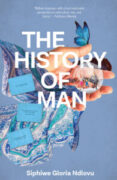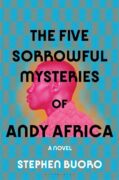The History of Man – Siphiwe Gloria Ndlovu (Penguin Random House South Africa, 2020) | A Review by Gitte Postel
The Catalyst Press book cover states that Ndlovu’s novel The History of Man is ‘set in a southern African country that is never named’. This is true, neither Rhodesia nor Zimbabwe is ever mentioned. But every other place in this novel can easily be located in what is now Zimbabwe: the Matopos hills in the south, where protagonist Emil Coetzee spends his happy childhood, and, some fifty kilometres further north, the city that he initially hates: Bulawayo, here consistently denoted by its nickname The City of Kings. The ceasefire date mentioned on the first page, 21-12-1979, the date which marks the end of the ‘bush war’ in which Emil Coetzee has come to play such a gruesome role, is exactly the day that was the beginning of the end of white minority rule in Zimbabwe.
Still, it does not really matter where and when this story takes place. This is not a book about Zimbabwean history, not even about British colonial history. It is the story of a man who happens to live in and love a country which he deep down feels is not really his to love – and the tragic events that leads to. As most great novelist do, Ndlovu works with big abstract notions – the limitations of linear history, the complexity of identity formation, the relationship between the individual and the state – and turns them into a single man’s story, which, in turn, sheds its light on the bigger things. Emil is part of the dynamics of British (post-)colonialism, even though he is not British – Coetzee is an Afrikaans name – which makes him somehow more suspect, but also less colonial. Or, in other words, it makes him, more than anything else, an ambiguous character, and I think that is exactly what he is meant to be. Emil’s first and last love is the savannah. But in between, in the period where he has lost touch with the elephant grass, he does not seem to be able to choose who or what he is.
This is Siphiwe Gloria Ndlovu’s second novel, and it turned out to be the second of a trilogy. The first one, the acclaimed The Theory of Flight, explores, like The History of Man, how circumstances can change the experience of the self, in relation to others and to the state. But where The Theory of Flight is set in a post-colonial state and is multifaceted – it consists of several interconnected stories of a broad range of people and harbours a touch of magic realism – The History of Man is a story of one man in a colonial setting, and it is told in a collected, rational, (almost) linear fashion. In her third novel, The Quality of Mercy, released in 2022, Ndlovu tries to bridge these two worlds. Here, a black policeman who also played a minor role in The History of Man, researches the disappearance and possible death of Emil Coetzee.
At first sight, the thing Ndlovu tries to capture in The History of Man seems to be how an innocent and happy and sensitive boy can grow into a cruel man, a man who turned his back on everything he loved and lost any sense of who he is. That is also more or less what is stated in the first chapter, titled ‘Prologue’: ‘His story, if it were ever told, would have to be told chronologically, in a linear fashion, with a definite beginning, middle and end – none of that starting-in-the-middle-or-end modern nonsense. It would have to be told in that fashion because that was the only way to make any sense of the dark, grey, concrete room with his naked light bulb (…) and the man with the blood on his hands.’
Notwithstanding the deceiving title of this first chapter, this is not Ndlovu talking, it is Emil, or to be more precise: the narrator, giving voice to Emil’s thoughts. This narrator seems to comply with Emil’s wishes: his story is chronologically told – except that the Prologue, like a stuck-out tongue, is almost literally repeated in the second last chapter. But the outcome of this narration is not what Emil hoped or expected: his story still does not make sense. In the end, it turns out to be a series of seemingly unrelated events. There are moments where he feels love, and there are moments when he feels loss. There is the series of choices he made. All the important events of his life are being narrated, but that does not help to create meaning or a meaningful identity.
Especially in South African literature, a white middle-aged male protagonist whose controlling of the narrative or gaze in a novel reveals his own blind spot, has been a recurrent feature. Mehring in Nadine Gordimer’s The Conservationist (1974), may be one of the most famous, but another example is only a few years old: Francois Smith’s Gustav van Aardt in Die Kleinste Ramp Denkbaar (2020). What Mehring and Van Aardt have in common is that they don’t intend to look beyond their gaze, even though they vaguely recognise that something is amiss. It is only in their uncoordinated search for something else that they sort of stumble upon a deeper truth. Emil Coetzee, however, is very much aware of his own choices. He is also very much aware of his own shortcomings. He knows he is as much driven by fear as he is by love, and that his fear, especially his fear for being homeless, is the stronger force. He knows he teams up with the bullies at school because it will keep him from being bullied. He knows he is not really able to love his own son, because his softness reminds him too much of his own father, who Emil once caught wearing women’s clothes. He knows that betraying his best friend several times because of this friend’s ‘weakness’, made him, Emil, the weaker man. The only thing Emil has ever been proud of is that he created the Organization of Domestic Affairs, an institute set to recording the lives of African people. With it he tried, in his own words, to make African citizens less vulnerable by giving them a history.
Ndlovu, or the narrator, does not elaborate on why Emil is so proud of this accomplishment, or even why he feels the urge to do it. This seems to be the one flaw in this novel: for an intelligent man like Emil, his pride does not seem to make much sense. We, as readers, of course know that African citizens already had a history, a fact which is underlined throughout the book by using the name The City of Kings, a referral to the founding of Bulawayo by Ndebele King Lobengula in 1840. We know Emil Coetzee – and all the British colonial institutes that did the same thing – did not give Africans a history, only incorporated them in colonial history. His life’s work does not make them less, but more vulnerable. To Emil, however, his work is what gives his own life purpose, and it is the only thing he does not question. On a subconscious level he probably thinks it will make him less vulnerable. But one cannot help feeling that he should have known that he was wrong.
Problems arise when the bush war starts, and the colonial government becomes extremely interested in the data Emil has collected. Emil does not believe in the war, but he cannot escape being sucked into it, because he does believe in the state. When the war and the state as he knows it come to an end, he is completely lost. His story is a circular one after all: it ends where it started, at the savannah. But now there is no love, and also no fear, there is just the feeling that he has lost all humanity.
The only demerit I can find in this novel, is that the creative freedom with which Ndlovu gave room to her ideas in Theory of flight (2028), is a little lost here: she very clearly wants to make a point. Or rather: ten points. Which she does. And while doing so, Emil becomes a little less convincing as a character, at least in the last section of the novel. Nevertheless: Ndlovu convincingly pictures the absurdity and pettiness and uselessness of colonial power, its means and its moral foundations, and the psychological motivations for excessive violence within the state, while at the same time presenting us with an absorbing and intriguing, very human story. An impressive accomplishment.
Gitte Postel
Literary translator & journalist


